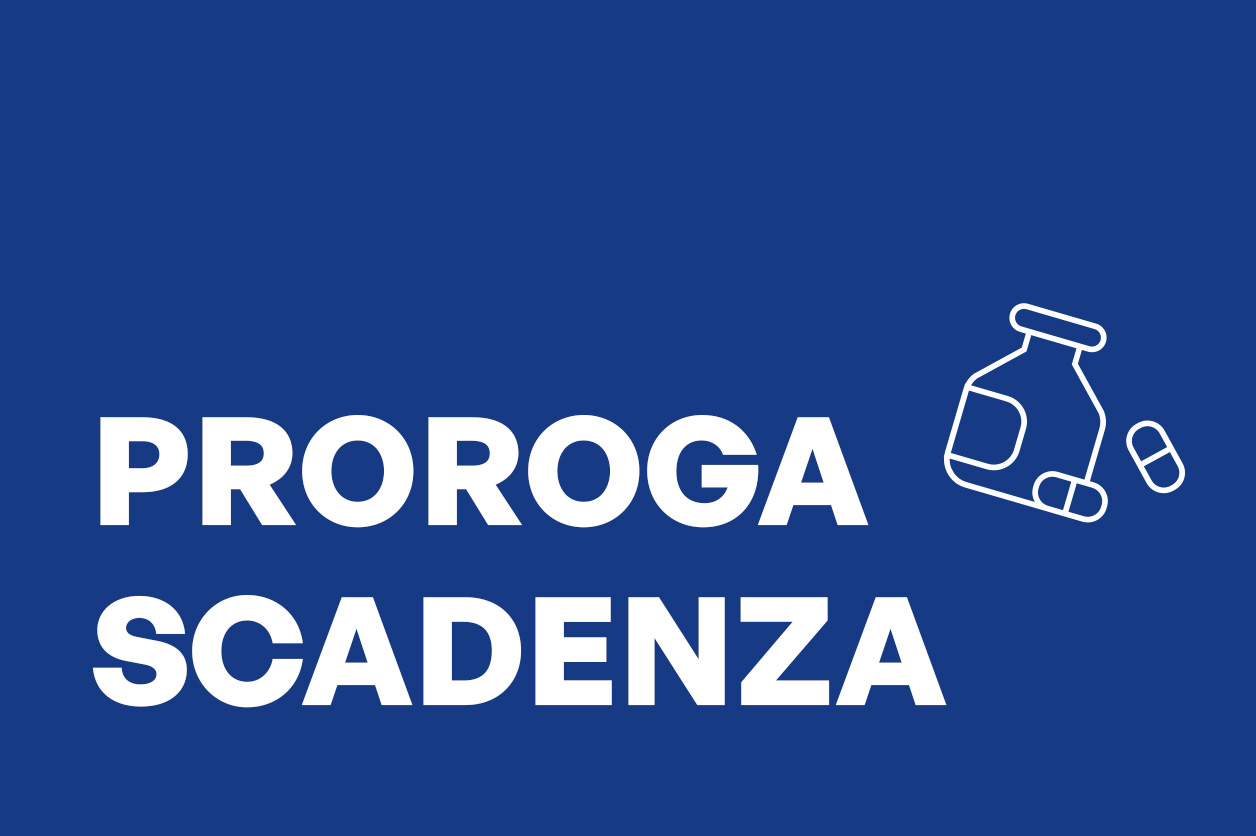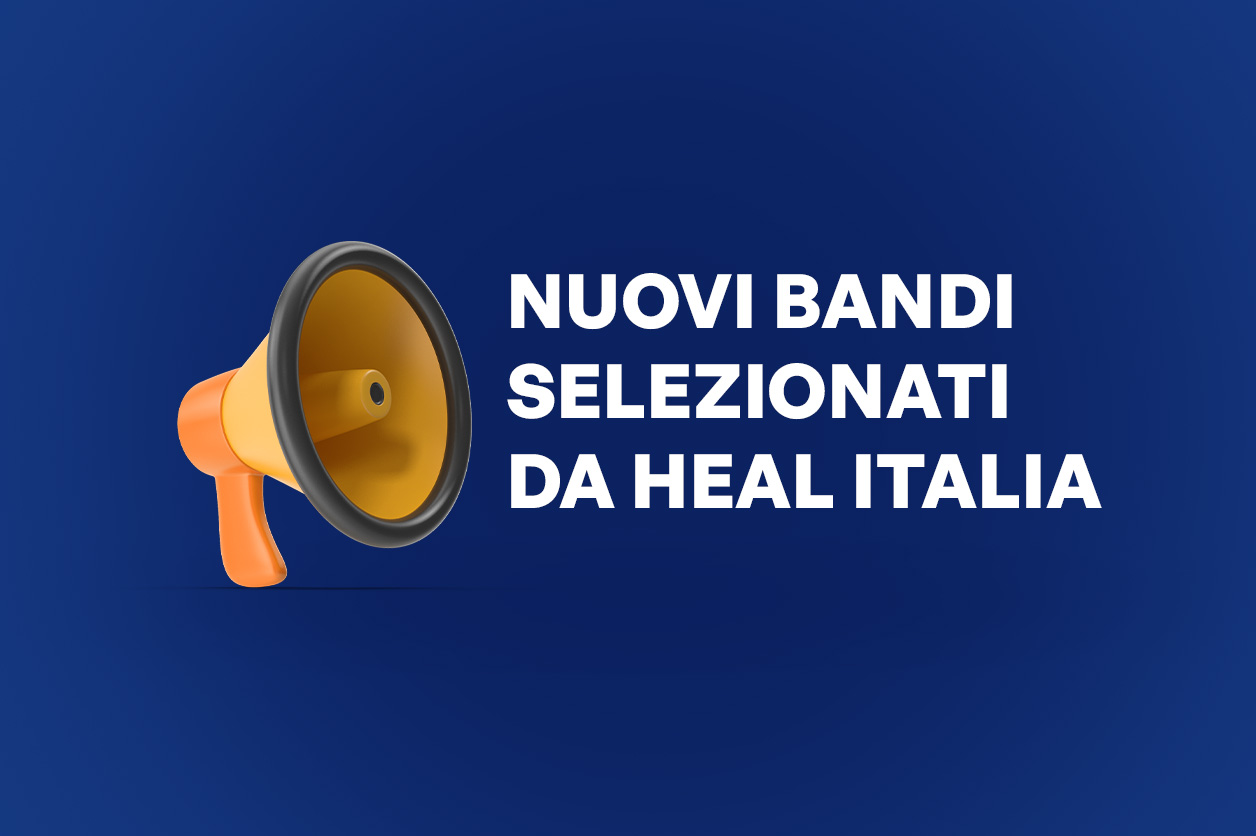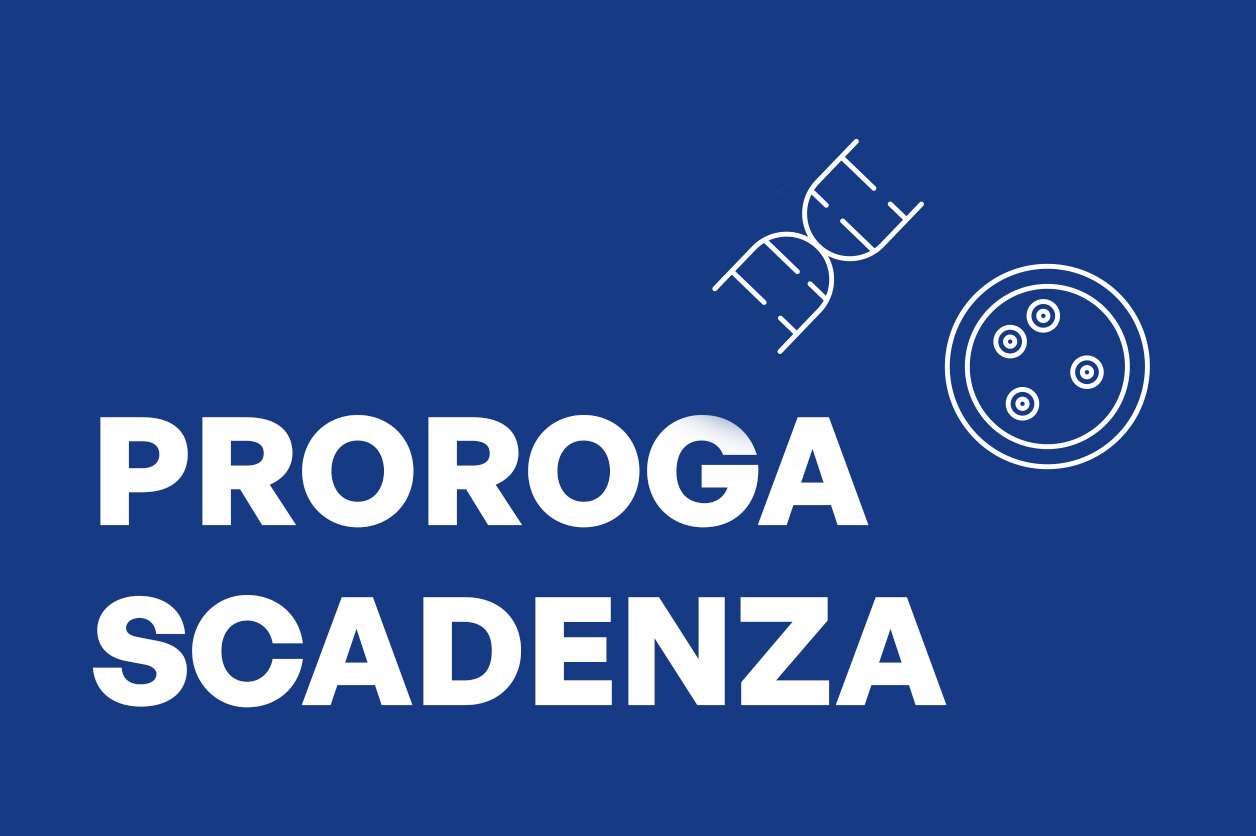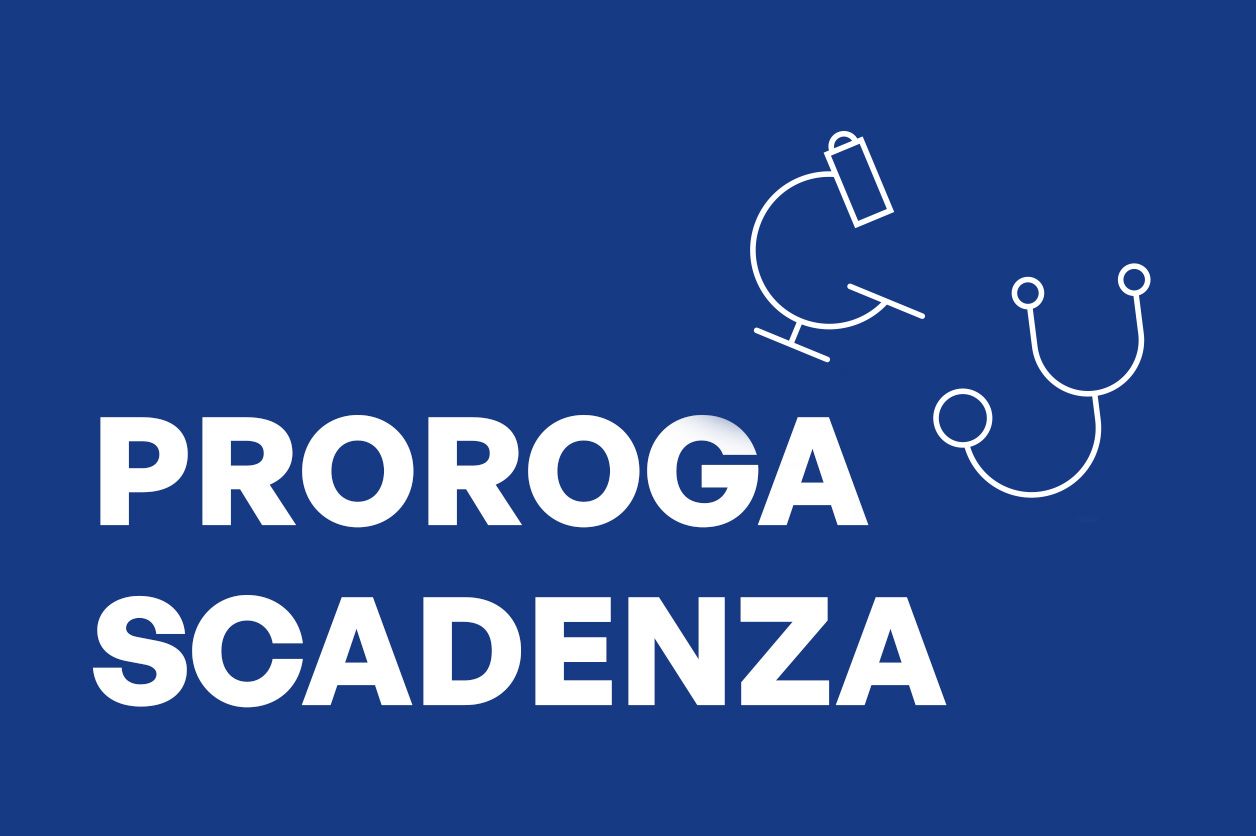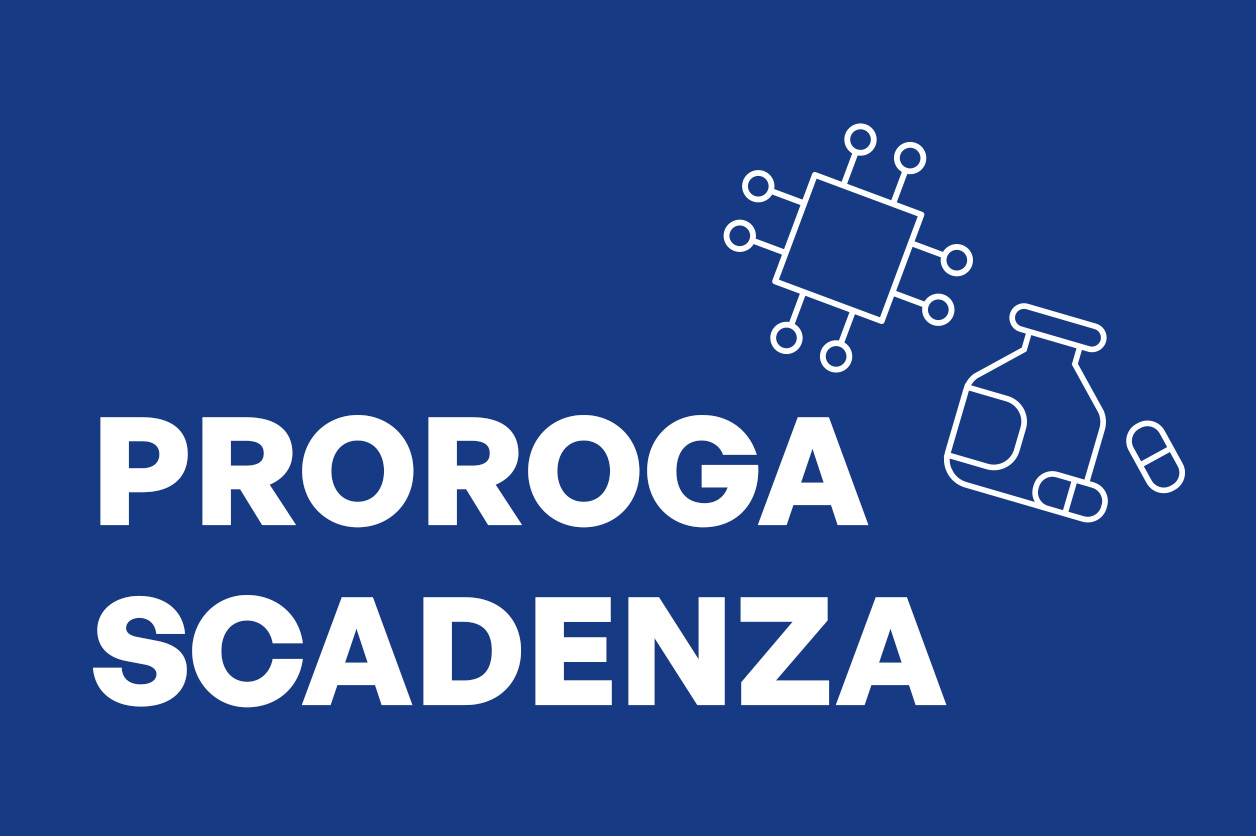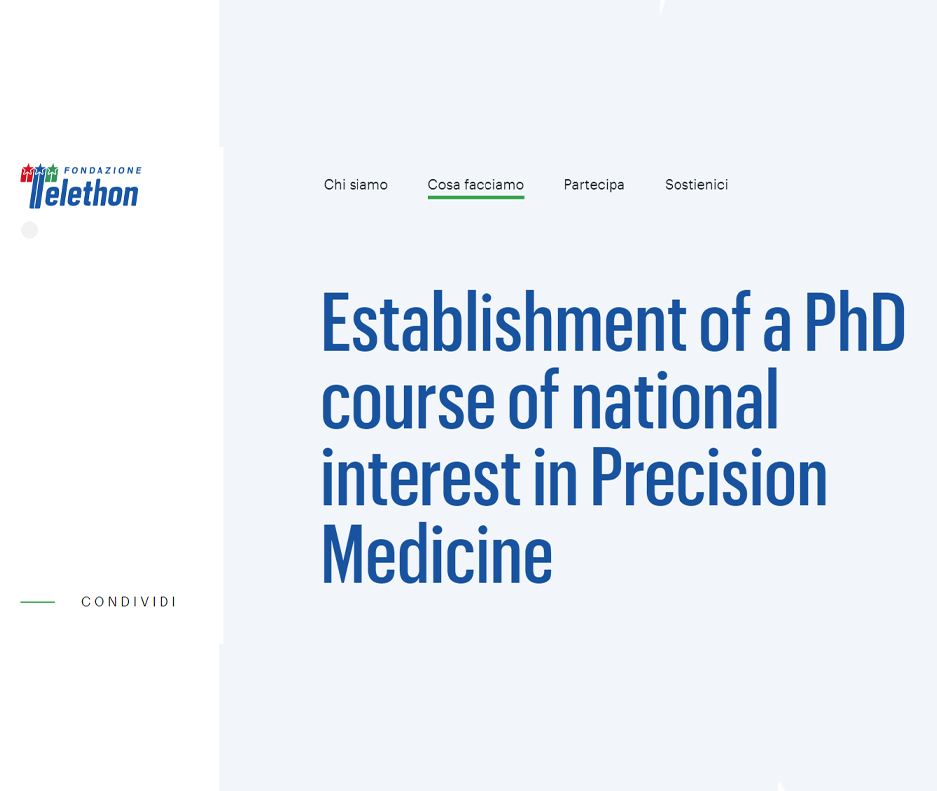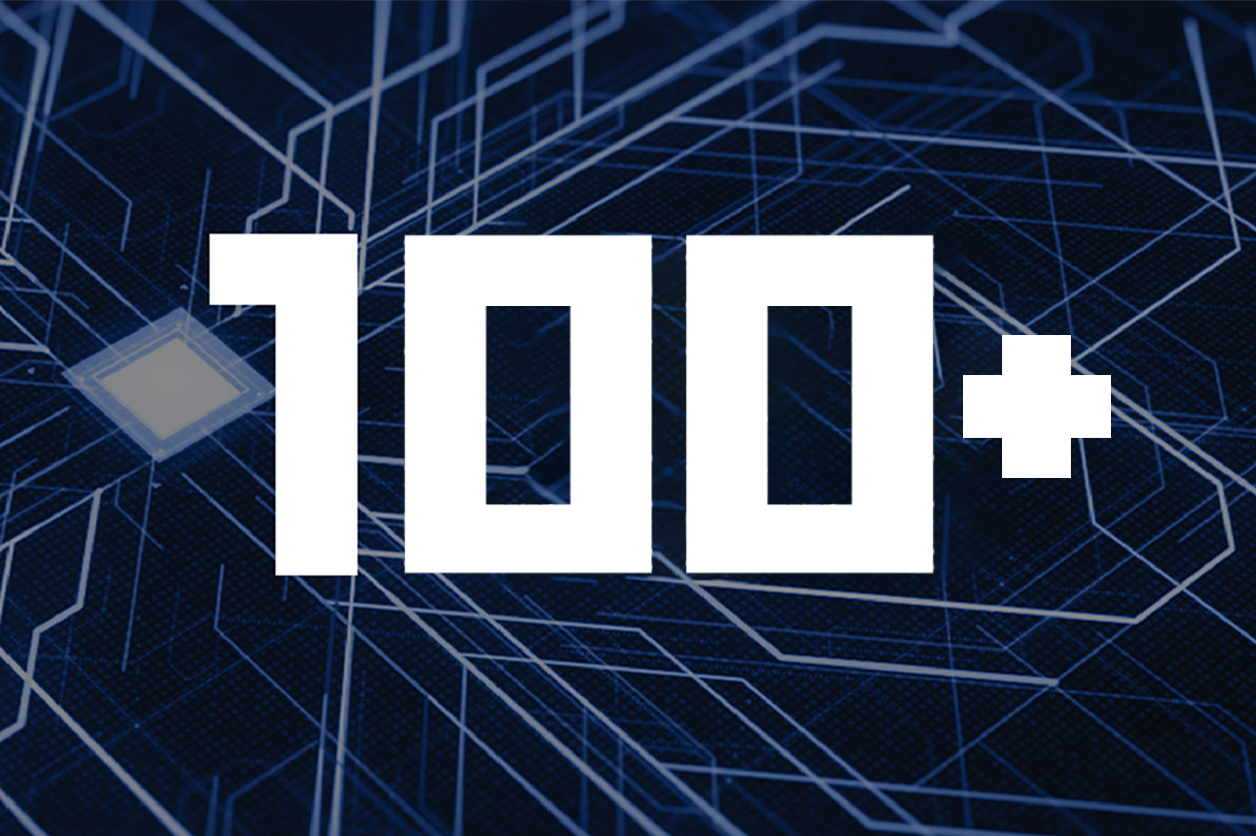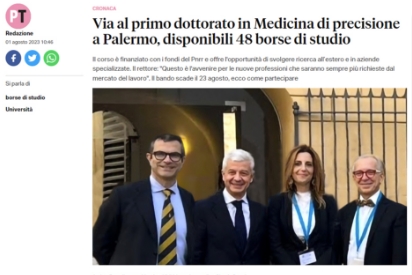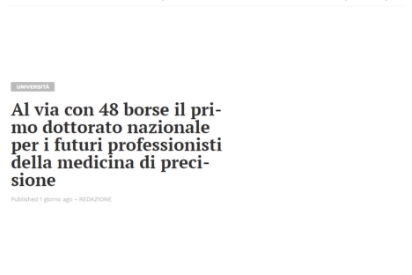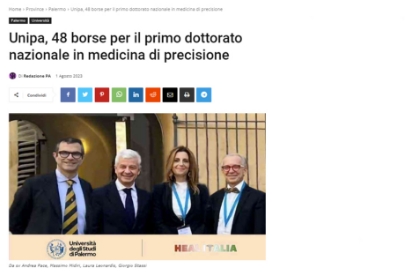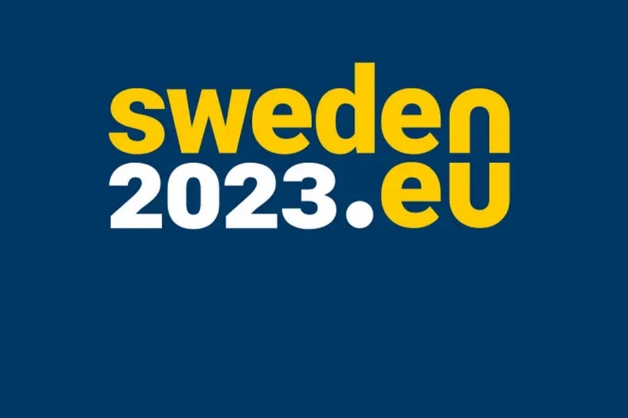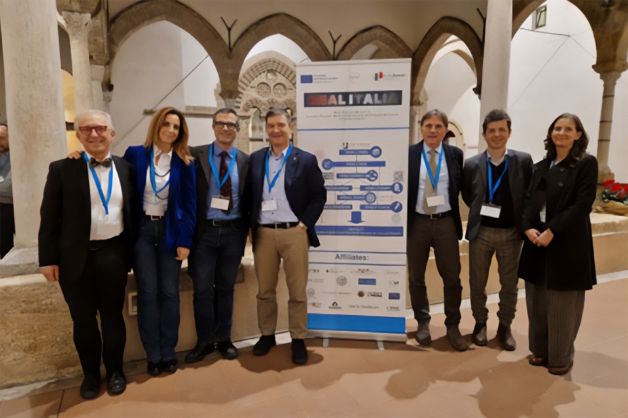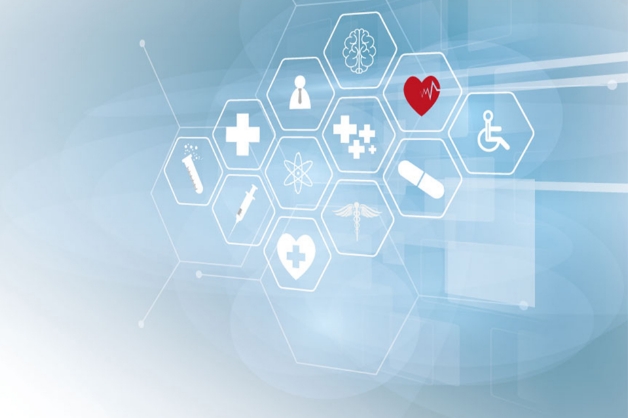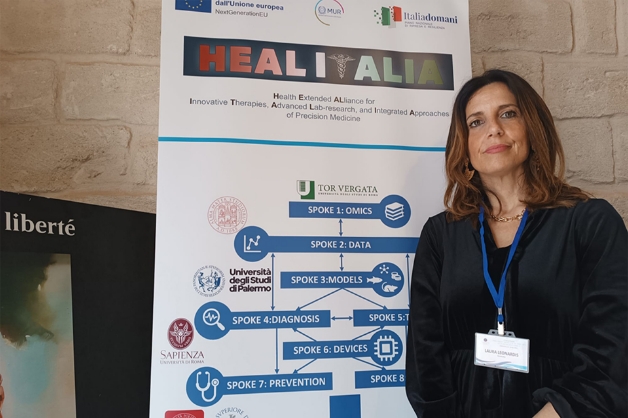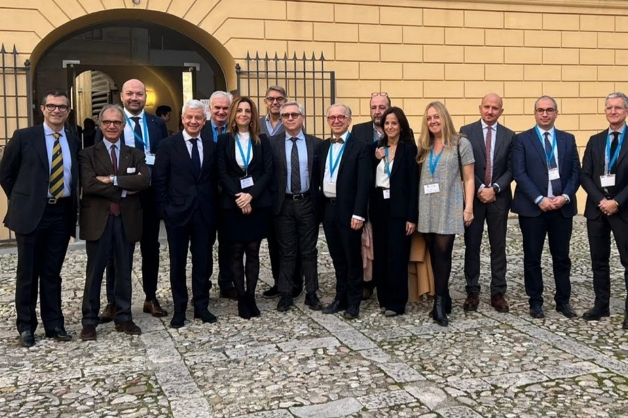Il Bando dello Spoke 5 proroga ulteriormente la scadenza al 12/02/2024.
heal_usr
Heal Italia seleziona nuovi Bandi.
Heal Italia ha selezionato tre bandi in target agli obiettivi della fondazione. A seguire i link:
ICPERMED
Spoke 3: Neurodegeneration
Scoperta Imprenditoriale
Proroga scadenza Bando Spoke 1-TOR VERGATA
Il Bando dello Spoke 1 proroga la scadenza al 12/02/2024.
Proroga scadenze Bandi Spoke 4-SAPIENZA e Spoke 7-UNIVPM
Il Bando dello Spoke 4 proroga la scadenza al 12/02/2024, mentre il Bando dello Spoke 7 proroga al 12/02/2024.
Proroga scadenze Bandi Spoke 5-UNIMIB e Spoke 6-UNIMORE
Il Bando dello Spoke 5 proroga la scadenza al 26/01/2024, mentre il Bando dello Spoke 6 proroga al 12/02/2024.
Attivazione delle FAQ sul sito
Da ora è attiva una sezione FAQ che racchiude tutti i dubbi più comuni riguardo i Bandi a Cascata. La sezione è divisa per spoke e verrà costantemente ampliata. Per maggiori informazioni vai alla pagina.
Telethon Foundation
Establishment of a PhD course of national interest in Precision Medicine.
100+ researchers for Italian Medical Scientific Research. 57% women with an average age of 34 years in the RTDA target
There are already 111 researchers contracted by Heal Italia, of which 87 RTDAs in the 57% female target with an average age of 34 years and 24 PhD students to whom a further 31 RTDAs and 48 PhDs from the national doctorate currently being recruited will be added. The Foundation intends to dedicate a campaign to them aimed at the concept of Open Science for Precision Medicine by calling on “National and International Scientific Research” to collaborate.
Palermo Today
The first doctorate in Precision Medicine in Palermo, 48 scholarships available
L’ora
The first national doctorate for future precision medicine professionals kicks off with 48 scholarships
Sicilia report
Unipa, 48 scholarships for the first national doctorate in precision medicine
Giornale di Sicilia
Precision medicine, 48 scholarships for the first doctorate for future professionals in Palermo
Holistic nosology

SPOKE 1
Holistic nosology
From patients to molecules and back: mapping the omic landscape of clinical to molecular environment, to identify, classify, and refine the phenotypes of multifactorial diseases
GENERAL OBJECTIVE
Mapping the omics landscape of clinical to molecular environment, Spoke 1 will define the molecular markers predictors of adverse or protective events underlying the molecular mechanisms of multifactorial diseases, which will offer potential novel therapeutic targets and clusters of prognostic factors.
Referent: Prof. ssa Eleonora Candi
Leader Institution: University of Rome Tor Vergata
Participating entities: ISS, NEUROMED, SAPIENZA, TLS, UNIBO, UNICA, UNIFG, UNIMORE, UNIVPM, UNIVR
Intelligent health

SPOKE 2
Intelligent health
Health Data Science: Data management and development of advanced methods, algorithms, and machine learning approaches integrating health big data.
GENERAL OBJECTIVE
Through an efficient data management and development of advanced methods, algorithms, and machine learning approaches integrating health big data, Spoke 2 will establish a model of a collaborative data and analysis platform in full compliance with the Italian privacy legislation for enabling the processing of predictive computer models on large volumes of digital heterogeneous data, opening new avenues for modern healthcare and personalized medicine.
Referent: Prof. Stefano Diciotti
Leader Institution: Alma Mater Studiorum University of Bologna
Participating entities: BIREX, ENGINEERING, IFO-IRE, ISS, NEUROMED, SAPIENZA, TOR VERGATA, UNICA, UNICT, UNIMIB, UNIMORE, UNIPI, UNIVR
Precision diagnostic

SPOKE 4
Precision diagnostic
Precision medicine integrating clinic and imaging biomarkers for a high precise in space and time diagnosis.
GENERAL OBJECTIVE
Implementing the computational tools in the clinical practice supported by the integrated analysis of digital data including bioimaging, omics and data derived from medical devices, performed using computational tools (AI and network medicine), Spoke 4 will deliver new, cost-effective, evidence-based, predictive risk-based and non-invasive diagnostic pathways for faster, earlier, more precise, accessible, and affordable early detection and screening of mono- and polygenic diseases and cancer.
Referente: Prof. Andrea Isidori
Leader Institution: Sapienza University of Rome
Participating entities: S.ORSOLA, TOR VERGATA, UNIBO, UNICA, UNICT, UNIFG, UNIMIB, UNIMORE, UNIPA, UNIPI, UNIVPM, UNIVR
Next-gen therapeutics

SPOKE 5
Next-gen therapeutics
From silico to bedside: design and validation ofinnovative tailored and personalized therapeutic strategies.
GENERAL OBJECTIVE
Validating new targets and therapeutic effectors, determining the cellular and molecular targets and completing the analysis in pre-clinical settings, spoke 5 will define the drug candidate and drug action mechanisms at the cellular and molecular level, establishing reproducible and quick pipelines for the preclinical validation of innovative therapies against monogenic, polygenic diseases and cancer.
Referent: Prof. Francesca Granucci
Leader Institution: University of Milano-Bicocca
Participating entities: CRO Aviano, ISS, M.NEGRI, NEUROMED, OPELLA, SAPIENZA, SIT, TLS, UNIBO, UNICA, UNICT, UNIMORE, UNIPA, UNIPI, UNIVR
Healthy toolbox

SPOKE 6
Healthy toolbox
Development of innovative devices for precision diagnosis and personalized therapy.
GENERAL OBJECTIVE
Spoke 6 will develop a technological toolbox of devices for applications both in precision diagnostics including biosensors, electronic and optical devices, integrated with microfluidics, and therapy such as robotic systems and development of nanotherapeutic agents for minimally invasive treatment, design and fabrication of strategies to selectively direct a drug towards a specific organ or tissue or cellular system, and to obtain the release/maintenance of the therapeutic agent at the target site for an extended period.
Referent: Prof. Massimo Dominici e Augusto Carlo Bortolotti
Leader Institution: University of Modena and Reggio Emilia
Participating entities: CRO Aviano, UNIBO, UNICA, UNICT, UNIFG, UNIMIB, UNIPA, UNIPI, UNIVR
Prevention strategies

SPOKE 7
Prevention strategies
Integrated and gender medicine approaches for prevention strategies based on environmental, lifestyle and clinical biometric data
GENERAL OBJECTIVE
Spoke 7 aims at predicting more accurately which prevention strategies/interventions for a particular disease will work in which groups of people and will assist in establishing public health recommendations for specific subgroups based on phenotype, genotype and the exposome. The proposed research aims at identifying determinants of the individual risk to develop diseases with a high impact on the health status of a population, such as cardiovascular, cancer, or endocrine-metabolic diseases
Referent: Prof. Gianluca Moroncini
Leader Institution: Politechnic University of Marche
Participating entities: IFO-IRE, ISS, NEUROMED, SAPIENZA, UNIBO, UNICA, UNICT, UNIFG, UNIMORE
Clinical exploitation

SPOKE 8
Clinical exploitation
Clinical validation and implementation of innovative predictive, preventive, diagnostic and therapeutic precision medicine approaches, based on established or emerging molecular and clinical phenotyping and AI-driven decision-making protocols.
GENERAL OBJECTIVE
This spoke aims on the clinical validation and implementation of precision medicine approaches, mainly based on data currently available in the participating centers or being generated by the applicants in this Spoke, and with readiness to exchange and apply emerging knowledge by interactions with all other Spokes.
Referent: Prof. Piero Marchetti e Chiara Cremolini
Leader Institution: University of Pisa
Participating entities: IFO-IRE, M.NEGRI, S.ORSOLA, SAPIENZA, TLS, TOR VERGATA, UNIBO, UNICA, UNICT, UNIMIB, UNIMORE, UNIPA, UNIVR, UPMC
Prediction models

SPOKE 3
Prediction models
Advanced prediction models for prognosis and therapeutic response based on comprehensive data treatment
GENERAL OBJECTIVE
Spoke 3 will develop advanced computational and animal models recapitulating the complex evolution of a cell even following an action of an external agent including compounds and radiation, which will support clinical decisions for the management of patients affected by monogenic and polygenic diseases including those dependent from specific mutations, and cancer, thus avoiding radiation toxicity to resistant patients and reducing the treatment costs.
Referent: Prof. Giorgio Stassi
Leader Institution: University of Palermo
Participating entities: BIREX, IFO-IRE, IOM, ISS, M.NEGRI, SAPIENZA, SIT, TOR VERGATA, UNIBO, UNICA, UNICT, UNIFG, UNIMIB, UNIMORE, UNIPI, UNIVPM
The PhD in Precision Medicine is underway
Heal Italia proposes the establishment of a Doctorate of National Interest (DIN) in Precision Medicine with administrative headquarters at the University of Palermo which is also the proponent of the project “HEALITALIA – Health Extended Alliance for Innovative Therapies, Advanced Lab- research, and Integrated Approaches of Precision Medicine” funded within the PNRR (Mission 4 “Education and Research” Component 2 “From Research to Business”) which represents the first Italian multidisciplinary research network of universities, IRCCS and supporting businesses of translational research for advanced diagnoses and therapies in the fight against cardiovascular, metabolic and rare diseases and cancer.
More HERE.
The professor. Andrea Pace and prof. Giorgio Stassi represent the Italian delegation at the Swedish Council Presidency conference “Life Sciences – The Era of Personalized Medicine”, 26 – 27 June 2023, Stockholm

The conference highlights life sciences, with the aim of taking the next step in the development and organization of personalized medicine, a key issue for Europe. It will provide an opportunity for international dialogue and collaboration between key stakeholders. The conference will highlight the importance of research and innovation, highlight opportunities and challenges and define Europe’s future course.
Precision Medicine, the extended Heal Italia partnership begins: the Alma Mater leads one of the Spokes
Funded under the PNRR, the initiative will develop knowledge, research and innovative technologies in order to bring the National Health System into the contemporary era of Precision Medicine. The University of Bologna leads one of the eight operational units, focused on the use of large-scale data to promote precision medicine in diagnostics and therapeutics.
The first national supply chain dedicated to research and innovation in the field of Precision Medicine is called HEAL ITALIA. The initiative is part of one of the 14 extended partnerships envisaged by the PNRR as part of Mission 4 Component 2 “From Research to Business”, with the aim of investing in innovation hubs to strengthen research chains at national level and promote their participation in European and global strategic value chains.
The HEAL ITALIA project – “Health Extended ALliance for Innovative Therapies, Advanced Lab-research, and Integrated Approaches of Precision Medicine”, which has a budget of 114.7 million euros, was presented by the University of Palermo, in as a proposing entity, together with 11 other universities, the Istituto Superiore di Sanità, 5 Scientific Research and Treatment Institutes (IRCCS), 6 companies and a research foundation.
This is the first national network of scientists, technologists and young researchers who, with a holistic and multidisciplinary approach, share and develop knowledge, research and innovative technologies in order to bring the National Health System into the contemporary era of Precision Medicine. Through new methods, new services and above all an important network of clinical data to support translational research, new tools will be developed for the diagnosis and advanced therapies of cancer and cardiovascular diseases, metabolic and rare genetic diseases.
The University of Bologna is one of the partner universities and participates directly in the activities of all eight operational units (Spoke) into which the project is divided.
“By participating in this partnership, the University of Bologna places itself at the forefront in the fight against pathologies with a high social and health impact, through the development of innovative techniques for diagnosis and therapy tailored to the patient”, declares Alberto Believe, Pro-Rector for Research of the Alma Mater. “The involvement of hospital structures, including the IRCCS Azienda Ospedaliero-Universitaria di Bologna, and important industrial partners will make it possible to make the most of the fruits of scientific research, to ensure increasingly cutting-edge healthcare for citizens”.
In particular, the Alma Mater will manage the coordination of Spoke 2, dedicated to “intelligent” health, i.e. the management of data and the development of advanced methods, algorithms and artificial intelligence approaches to integrate health big data.
“The University of Bologna will coordinate the Spoke of Intelligent Health focused on the use of large-scale data to promote precision medicine in diagnostics and therapeutics”, explains Stefano Diciotti, professor at the Department of Electrical Energy and Energy Engineering. ‘Information “Guglielmo Marconi” and coordinator of Spoke 2. “This objective will be achieved by exploiting multi-level big data storage and analysis solutions, which comply with current legislation regarding the safety and protection of health data; in particular, it will be used innovative artificial intelligence systems to integrate various types of data, such as clinical, molecular and imaging data”.
As a whole, HEAL ITALIA wants to consolidate and innovate the results already achieved in oncology by transferring them to further emerging contexts, promoting basic research that generates prevention, screening, risk stratification, early diagnosis and personalized precision therapies for cancer phenotypes. recently defined disease. Applied to all medical disciplines, this approach will allow the National Health Service to apply safer and more effective individual protocols in areas such as, for example, precision surgery and precision radiotherapy.
The project is very ambitious, as it includes eight interregional networks that cover all areas of interest in precision medicine (from research on omics sciences, to new technologies for early diagnosis, to the repositioning of drugs, to new protocols for primary prevention, secondary and tertiary, to new clinical protocols for radiotherapy treatments), with the participation of numerous established scientists operating for the first time within the same “mother network”. The objective is to bring solutions, innovative therapies and early diagnosis to the patient’s bedside, allowing the citizen to discover the pathology as soon as possible and treat it as best as possible, and offering the healthcare system useful solutions for the daily management of local and management services of the patient.
“It is an opportunity of a magnitude that has never been seen before for the Italian research system and which must be seized, aware, from the beginning, that the resources deployed by the European Union represent an investment rather than financing; subtle semantic difference that must make all actors in the field responsible”, says Andrea Pace, President of the HEAL ITALIA Foundation. “This challenge requires a shared, coordinated and multi-sectoral strategy, based on a transversal research methodological chain that includes all phases, from prevention and screening to advanced diagnostics up to personalized medicine, with the long-term vision of satisfying the right of each person to receive effective, personalized and sustainable health services in a homogeneous way, respecting privacy and data protection, for the benefit of the entire community”.
Overall, the research team is made up of 350 researchers belonging to the project partners: University of Tor Vergata, Alma Mater Studiorum – University of Bologna, University of Palermo, Sapienza – University of Rome, University of Milan Bicocca, University of Modena and Reggio Emilia, Polytechnic University of Marche, University of Pisa, University of Cagliari, University of Catania, University of Foggia, University of Verona, the Istituto Superiore di Sanità, Fondazione Toscana Life Sciences, IRCCS Azienda Ospedaliero-Universitaria di Bologna Sant’Orsola, BI-REX National Competence Center, IRCCS Mediterranean Neurological Institute (Neuromed), IRCCS Hospital Physiotherapy Institutes, IRCCS Mario Negri Pharmacological Research Institute, IRCCS Oncological Reference Center of Aviano, Mediterranean Oncological Institute, Engineering Informatics Engineering, Sordina Iort Technologies, Sanofi CHC, UPMC Italy. A team that will be further strengthened with the recruitment of over 100 new researchers and will train more than 100 doctoral students.
Precision medicine, Heal Italia begins: first national supply chain
Heal Italia was born, the first national supply chain dedicated to research and innovation in the field of Precision Medicine, financed with 114.7 million euros. The initiative is part of one of the 14 extended partnerships envisaged by the Pnrr as part of Mission 4 Component 2 ‘From Research to Business’, with the aim of investing in innovation hubs to strengthen research chains at national level and promote their participation in European and global strategic value chains.
The Heal Italia project (Health Extended Alliance for Innovative Therapies, Advanced Lab-research, and Integrated Approaches of Precision Medicine) was presented by the University of Palermo, as the proposing entity, together with 11 other Universities, the Istituto Superiore di Healthcare, five Scientific Research and Treatment Institutes, six companies and a research foundation, and represents the first national network of scientists, technologists and young researchers who develop innovative knowledge and technologies in order to bring the National Health System into the era contemporary Precision Medicine through new methods, new services and a network of clinical data to support translational research for advanced diagnoses and therapies in the fight against cancer and cardiovascular, metabolic and rare diseases.
The role of the Bi-Rex-Competence Center of Bologna specialized in Big Data is very important, which within this project will work to support digital transformation and Big Data Management processes in the world of healthcare, pharmaceuticals, research and innovation. Overall, the research team is made up of 350 researchers belonging to the project partners and will be further strengthened with the recruitment of more than one hundred new researchers and the training of over one hundred doctoral students.
The project, coordinated by Giorgio Stassi, professor of Technical Sciences of Laboratory Medicine, has the aim of “identifying and reducing the extremely large health inequalities between Northern and Southern Italy today, developing a roadmap of interregional collaboration to define innovative strategies based on scientific evidence and easily usable in clinical practice,” explains Stassi. “The overall goal is to provide novel, cost-effective and evidence-based predictive and non-invasive diagnostic pathways.”
The aim is therefore to create solutions to support innovative therapies and early diagnosis, allowing the citizen to discover the pathology as soon as possible and treat it as best as possible and offering the healthcare system useful systems for the daily management of local services and for taking care of the patient. “Our vision is to facilitate the transition to ultrasensitive, cost- and time-efficient detection tools that enable early diagnosis and frequent screening of patients, two of the cornerstones of precision medicine approaches. The development of innovative devices for precision diagnosis and personalized therapy will influence the course of the disease and patient-specific outcomes.”
The project’s eight operational units follow the logical path of translational research and range from the Holistic Nosology spoke to identify, classify and refine the phenotypes of multifactorial diseases, to the Intelligent Health spoke for data management and the development of advanced methods, algorithms and machine learning approaches based on artificial intelligence and machine learning for the integration of healthcare data, Prediction Models for the development of methods to support early diagnosis and personalized prognosis, 4D-Precision Diagnostics for a diagnosis “precise in space and time ” based on four-dimensional approaches that integrate clinical and imaging biomarkers, Next-Gen Therapeutics for the design and validation of innovative and personalized therapeutic strategies based on individual patient data, Healthy Toolbox for the development of innovative devices for diagnosis and precision therapies , Prevention Strategies for the development of prevention and gender medicine strategies based on integrated approaches and environmental, lifestyle and clinical biometric data, Clinical Exploitation for the clinical validation and implementation of innovative predictive precision medicine approaches , preventive, diagnostic and therapeutic, based on consolidated or emerging molecular and clinical phenotypes and on decision-making protocols guided by artificial intelligence.
“We have done great team work with all the participating subjects, not only from the point of view of the scientific approach, but also by sharing the management approach, overcoming exclusively academic or corporate logics and providing balanced governance roles between public and private subjects to guarantee the functionality of the choices”, states Andrea Pace, President of the Heal Italia Foundation. “The proposed and shared work scheme involved the identification of thematic, interdisciplinary and highly interconnected Spokes to develop solutions for classes of pathologies with high social impact such as cancer and cardiovascular, metabolic and rare diseases. This challenge requires a shared, coordinated and multi-sectoral strategy, based on a transversal research methodological chain that includes all phases, from prevention and screening to advanced diagnostics and personalized medicine, with the long-term vision of satisfying the right to every person to receive effective, personalized and sustainable health services in a homogeneous way, respecting privacy and data protection, for the benefit of the entire community”.

